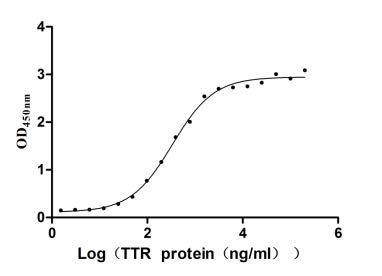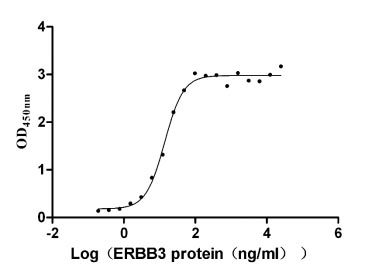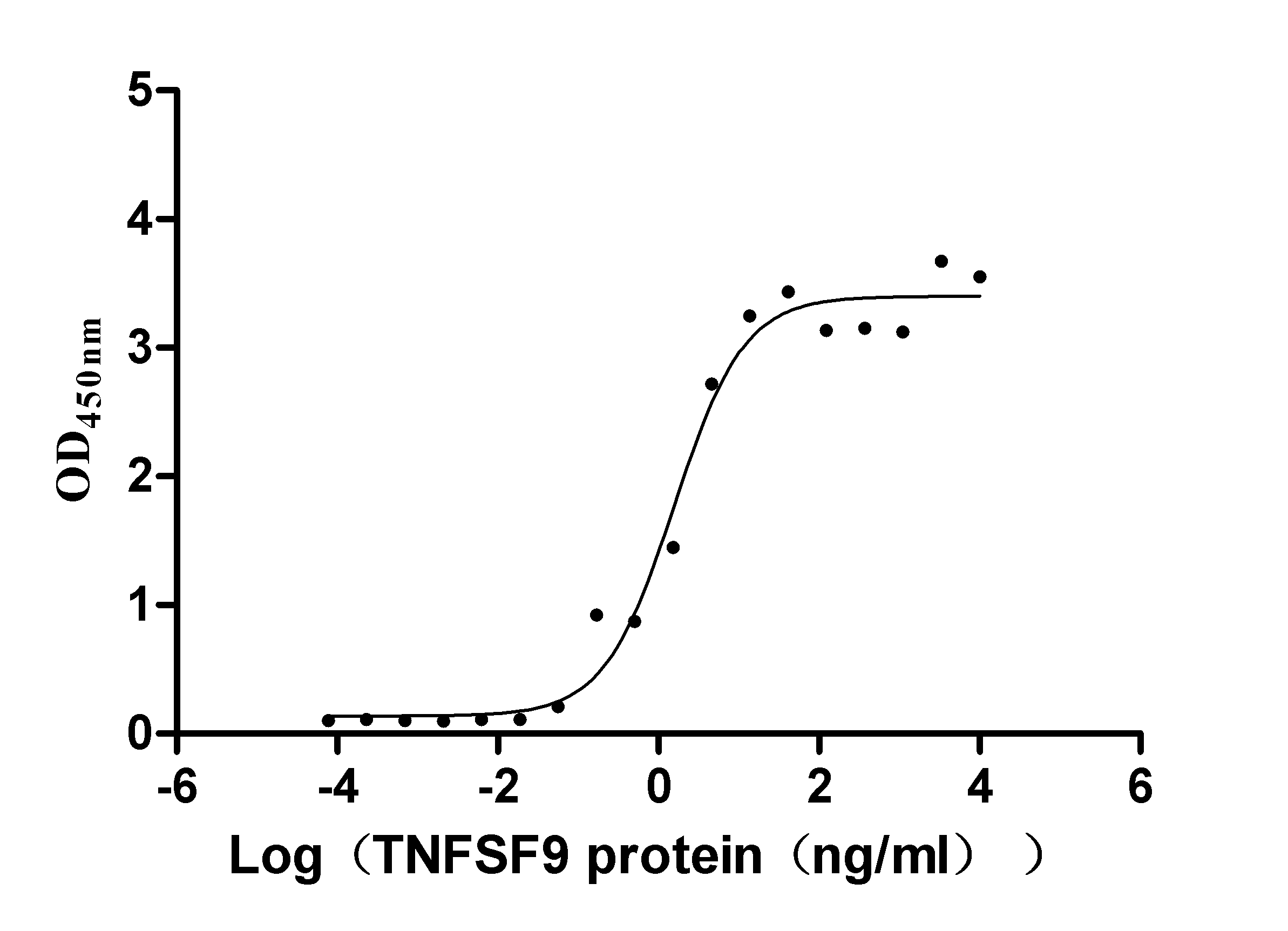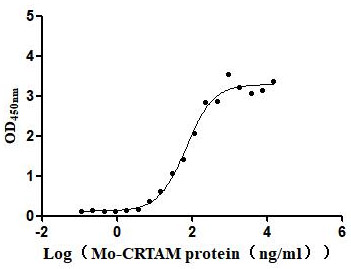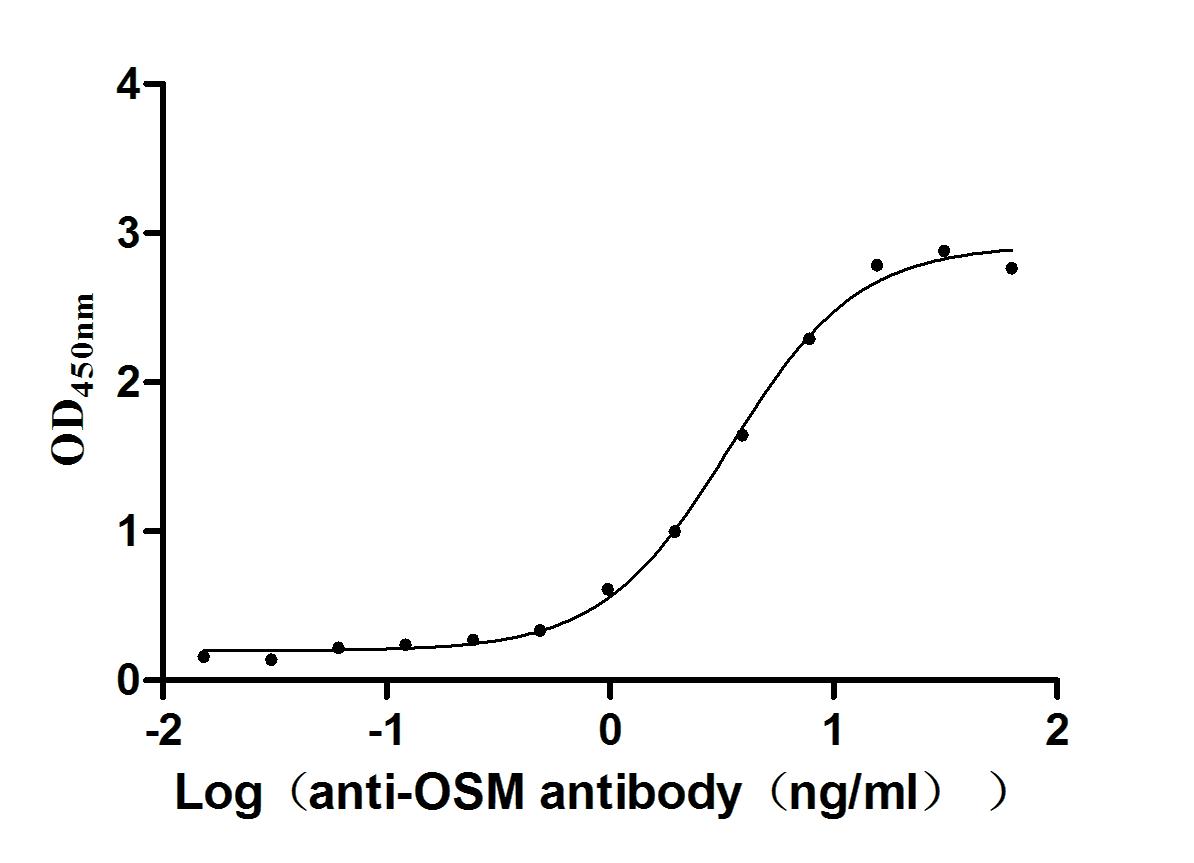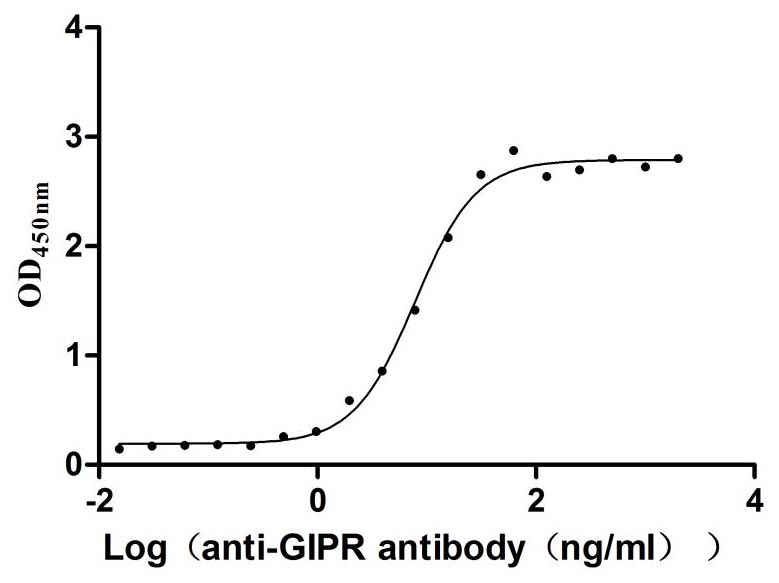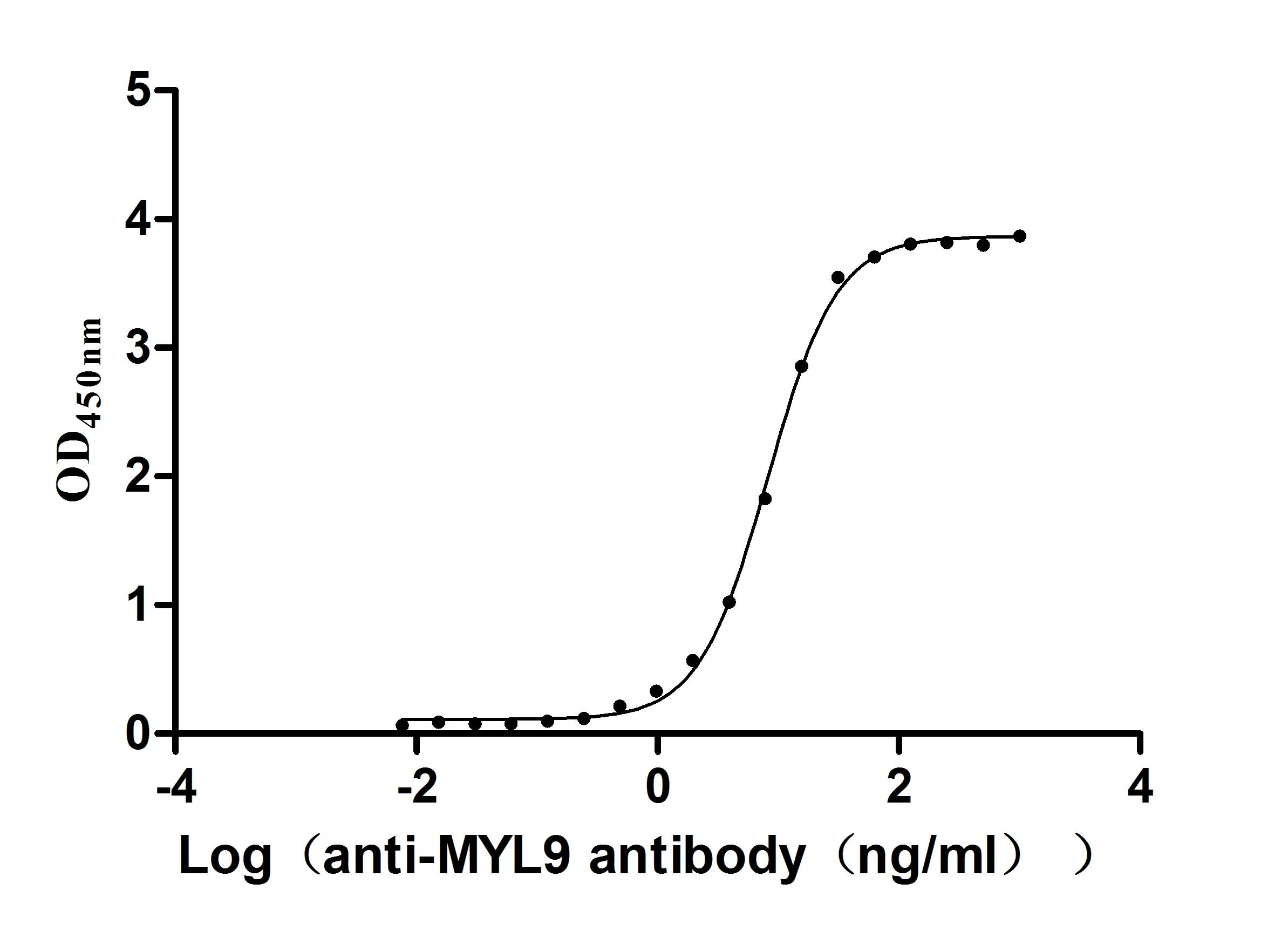Recombinant Human CD151 antigen (CD151)
-
货号:CSB-CF004880HU
-
规格:
-
来源:in vitro E.coli expression system
-
其他:
产品详情
-
基因名:
-
Uniprot No.:
-
别名:CD151; TSPAN24; CD151 antigen; GP27; Membrane glycoprotein SFA-1; Platelet-endothelial tetraspan antigen 3; PETA-3; Tetraspanin-24; Tspan-24; CD antigen CD151
-
种属:Homo sapiens (Human)
-
蛋白长度:Full length protein
-
表达区域:1-253
-
氨基酸序列MGEFNEKKTTCGTVCLKYLLFTYNCCFWLAGLAVMAVGIWTLALKSDYISLLASGTYLAT AYILVVAGTVVMVTGVLGCCATFKERRNLLRLYFILLLIIFLLEIIAGILAYAYYQQLNT ELKENLKDTMTKRYHQPGHEAVTSAVDQLQQEFHCCGSNNSQDWRDSEWIRSQEAGGRVV PDSCCKTVVALCGQRDHASNIYKVEGGCITKLETFIQEHLRVIGAVGIGIACVQVFGMIF TCCLYRSLKLEHY
Note: The complete sequence including tag sequence, target protein sequence and linker sequence could be provided upon request. -
蛋白标签:N-terminal 10xHis-tagged
-
产品提供形式:Liquid or Lyophilized powder
Note: We will preferentially ship the format that we have in stock, however, if you have any special requirement for the format, please remark your requirement when placing the order, we will prepare according to your demand. -
缓冲液:Lyophilized from Tris/PBS-based buffer, 6% Trehalose, pH 8.0
-
储存条件:Store at -20°C/-80°C upon receipt, aliquoting is necessary for mutiple use. Avoid repeated freeze-thaw cycles.
-
保质期:The shelf life is related to many factors, storage state, buffer ingredients, storage temperature and the stability of the protein itself.
Generally, the shelf life of liquid form is 6 months at -20°C/-80°C. The shelf life of lyophilized form is 12 months at -20°C/-80°C. -
货期:Basically, we can dispatch the products out in 1-3 working days after receiving your orders. Delivery time may differ from different purchasing way or location, please kindly consult your local distributors for specific delivery time.Note: All of our proteins are default shipped with normal blue ice packs, if you request to ship with dry ice, please communicate with us in advance and extra fees will be charged.
-
注意事项:Repeated freezing and thawing is not recommended. Store working aliquots at 4°C for up to one week.
-
Datasheet & COA:Please contact us to get it.
相关产品
靶点详情
-
功能:Essential for the proper assembly of the glomerular and tubular basement membranes in kidney.; (Microbial infection) Plays a role in human papillomavirus 16/HPV-16 endocytosis upon binding to cell surface receptor.
-
基因功能参考文献:
- Results provide evidence that bi-allelic loss-of-function mutations in CD151 underlie an autosomal recessive mechano-bullous disease with systemic features suggesting that CD151 as the 20th causative, EB-associated gene. PMID: 29138120
- The expression levels of RNASEH2A, CDK1, and CD151 and their combination could predict the survival of renal cell carcinoma patients. PMID: 29843367
- We conclude that LAMC1 mRNA acts as a trans regulator to stimulate CD151 expression by competing for miR-124 binding in hepatocellular carcinoma cells. PMID: 28524360
- CD151 overexpression was associated with poor survival in human solid tumors. CD151 could be a valuable prognosis biomarker or a potential therapeutic target of solid tumors. PMID: 27888619
- Levels of CD151 Gene Expression are Independently Associated with Survival in Chemoradiotherapy-Naive Patients PMID: 27577713
- CD151 induces osteosarcoma metastasis likely by regulating cell function through adhesion signaling PMID: 27556355
- These results elucidated that PIK3C2A mRNA acts as a miR-124 decoy to regulate CD151 and to affect hepatocellular carcinoma malignant phenotypes. PMID: 27270320
- the tetraspanin CD151 contributes to survival of a subset of high-grade serous ovarian cancer cell lines. PMID: 28273451
- CD151 in humans thus marks and enables hyperproliferative T cells. PMID: 28954890
- Here, we demonstrate for the first time that the tetraspanin CD151 supports lymphocyte adhesion to liver endothelium. We show that CD151 is upregulated in chronic liver disease and hepatocellular carcinoma (HCC) and is regulated on endothelium by tissue remodeling and procarcinogenic factors. PMID: 28473332
- Our data uncover a previously unknown mechanism for modulating human airway smooth muscle contraction, implicating CD151 as a determinant of airway hyper-responsiveness in vivo, likely through regulation of G protein-coupled receptor-induced calcium mobilization and protein kinase c signaling PMID: 27233153
- Reciprocal fusion gene involving TSPAN4-CD151 is associated with infratentorial anaplastic ependymoma. PMID: 27401149
- High CD151 expression is associated with hepatocellular carcinoma. PMID: 27599545
- Eight and five of the nine samples were negative for cell adhesion molecule 1 and Osterix respectively. The other markers showed no statistical significance(CD151,ALP). osteoblastic differentiation can occur in carcinoma cells and that cell adhesion molecule 1 could be a useful marker for identifying this phenomenon in carcinoma tissues. PMID: 28651491
- High CD151 expression is associated with Human Cytomegalovirus Infection. PMID: 27147745
- Knockdown and knockout models revealed that CD151 and Tspan8 act as molecular facilitators in wound healing, angiogenesis and tumor progression. [review] PMID: 28408484
- CD151 participates in communication between PC3 prostate cancer cells and bone microenvironment and the process can be considered as a significant step of prostate cancer progression and metastasis. PMID: 28291843
- Platelet-enhanced endothelial colony forming cell angiogenesis requires platelet tetraspanin CD151 and alpha6beta1 integrin signaling. PMID: 26749288
- these findings identify CD151 and its interactions with integrins a3 and a6 as potential therapeutic targets for inhibiting stemness-driving mechanisms and stem cell populations in Glioblastoma. PMID: 26992919
- CD151 knockdown inhibits the expression of MMP9 through the GSK-3b/bcatenin pathway and also inhibits Osteosarcoma (OS)migration and invasion in vitro and metastasis in vivo in highly metastatic OS. PMID: 26707073
- the role of the CD151-alpha3beta1 complex in carcinoma progression is context dependent, and may depend on the mode of tumor cell invasion. PMID: 26418968
- selective interaction with PY12 oligomers is crucial for platelet aggregation and thrombus stabilization PMID: 26245294
- In high grade DCIS, when stratified according to the HER2 status, in the HER2-negative subgroup, CD151 assessed in combination with alpha3beta1 was significantly correlated with prognosis. PMID: 26464707
- Data show that CD151 protein (CD151)-alpha3beta1 integrin complexes cooperated with epidermal growth factor receptor (EGFR) to drive tumor cell motility. PMID: 26377974
- Tetraspanin CD151 Is a Negative Regulator of FcepsilonRI-Mediated Mast Cell Activation. PMID: 26136426
- our study demonstrates that CD151-alpha3beta1 integrin complexes regulate ovarian tumor growth by repressing Slug-mediated epithelial to mesenchymal transition and Wnt signaling PMID: 25356755
- Knockdown CD151 expression by targeted siRNA could inhibit the related downstream intercellular signaling pathways including FAK, PI3KAKT, MEKERK1/2MAPK as well as the expression of MMP9 and VEGF. PMID: 25351816
- Increased expression of CD151 is associated with gastric cancer. PMID: 25119599
- might be a potential prognostic indicator for gallbladder carcinoma PMID: 24890568
- CD151 overexpression is associated with gastric cancer. PMID: 24306658
- Taken together, it was concluded that CD151 promotes the proliferation and migration of PC3 cells through the formation of CD151-integrin complex and the activation of phosphorylated ERK. PMID: 22684562
- CD151 expression is associated with lymphatic vessel density in prostate cancer. PMID: 24174171
- Data indicate that overexpression of CD151 significantly attenuated the tumor suppressive effect of miR-22. PMID: 24495805
- Review on CD151 in cancer progression and metastasis. PMID: 24247563
- CD151-AAA mutant was able to promote cell proliferation, while the ability of CD151AAA to promote cell proliferation was decreased compared with the CD151 group. PMID: 23007325
- High CD151 expression correlated with aggressive behavior in non-small cell lung cancer.High CD151 protein expression was an independent negative prognostic factor for overall survival in lung adenocarcinoma, but not in lung squamous cell carcinomas. PMID: 23570797
- The expression rate of CD151 seemed to increase gradually according to the depth of invasion and pathologic stage in gastric ademocarcinoma. PMID: 24005419
- Data indicate that alpha3beta1 and the tetraspanin CD151 directly associate at the front and retracting rear of polarised migrating breast carcinoma cells. PMID: 22986527
- High CD151 expression is associated with glioma. PMID: 22495828
- CD151 is positively associated with the invasiveness of HGC, and CD151 or the combination of CD151 and integrin alpha3 is a novel marker for predicting the prognosis of HGC patient. PMID: 23533596
- Overexpression of CD151 was observed in a significant proportion of glioblastomas. CD151 overexpression was closely associated with MGMT methylation and was a prognostic factor for predicting worse survival. PMID: 22926763
- High CD151 expression is associated with skin squamous cell carcinoma. PMID: 22824799
- These data show that complex formation of CD151 with laminin-binding integrins and integration of the complex into tetraspanin-enriched microdomains are critical for human papillomavirus type 16 endocytosis. PMID: 23302890
- clinical data analyses revealed a strong correlation between CD151 and ErbB2 expression and metastasis-free survival of breast cancer patients PMID: 22952421
- CD151 support of alpha6 random defined diffusion is specific and functionally relevant, and probably underlies diverse CD151 functions in skin, kidney and cancer cells. PMID: 22328509
- CD151 links alpha(3)beta(1)/alpha(6)beta(1) integrins to Ras, Rac1, and Cdc42 by promoting the formation of multimolecular complexes in the membrane, which leads to the up-regulation of adhesion-dependent small GTPase activation PMID: 22843693
- Secreted CD151 can be a useful genetic marker for the diagnosis of metastatic prostate cancer. PMID: 22457534
- CD151 importantly modulates podocyte function. PMID: 22338088
- CD151 overexpression in breast cancer was found to be significantly associated with larger tumour size, higher nodal stage, advanced stage, absence of oestrogen receptor and progesterone receptor and human epidermal growth factor receptor 2 overexpression PMID: 22294188
- Data show that CD151 acts as an important player in the progression of HCC in an integrin beta1-dependent manner. PMID: 21961047
显示更多
收起更多
-
相关疾病:Nephropathy with pretibial epidermolysis bullosa and deafness (NPEBD)
-
亚细胞定位:Membrane; Multi-pass membrane protein.
-
蛋白家族:Tetraspanin (TM4SF) family
-
组织特异性:Expressed in a variety of tissues including vascular endothelium and epidermis. Expressed on erythroid cells, with a higher level of expression in erythroid precursors than on mature erythrocytes.
-
数据库链接:
HGNC: 1630
OMIM: 179620
KEGG: hsa:977
STRING: 9606.ENSP00000324101
UniGene: Hs.654379
Most popular with customers
-
Recombinant Human Transthyretin (TTR) (Active)
Express system: Mammalian cell
Species: Homo sapiens (Human)
-
Recombinant Human Receptor tyrosine-protein kinase erbB-3 (ERBB3), partial (Active)
Express system: Mammalian cell
Species: Homo sapiens (Human)
-
Recombinant Human Tumor necrosis factor receptor superfamily member 9 (TNFRSF9), partial (Active)
Express system: Mammalian cell
Species: Homo sapiens (Human)
-
Recombinant Human Zymogen granule protein 16 homolog B (ZG16B) (Active)
Express system: Mammalian cell
Species: Homo sapiens (Human)
-
Recombinant Mouse Cell adhesion molecule 1 (Cadm1), partial (Active)
Express system: Mammalian cell
Species: Mus musculus (Mouse)
-
Recombinant Human Oncostatin-M (OSM), partial (Active)
Express system: Mammalian cell
Species: Homo sapiens (Human)
-
Recombinant Rat Gastric inhibitory polypeptide receptor (Gipr), partial (Active)
Express system: Mammalian cell
Species: Rattus norvegicus (Rat)
-
Recombinant Human Myosin regulatory light chain 12B(MYL12B) (Active)
Express system: E.coli
Species: Homo sapiens (Human)


